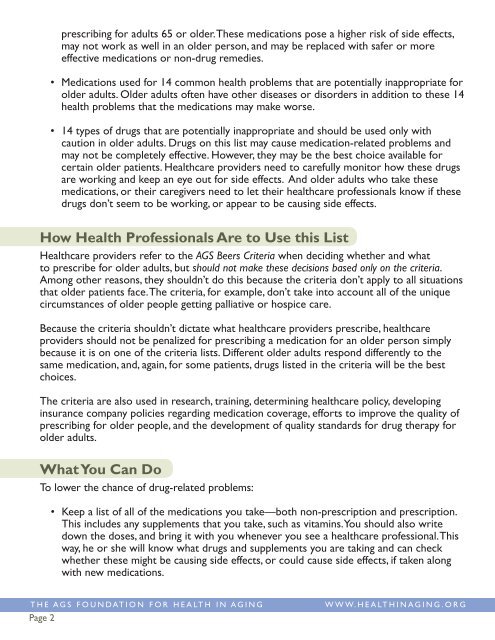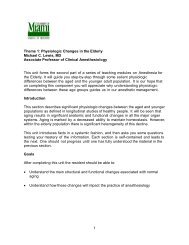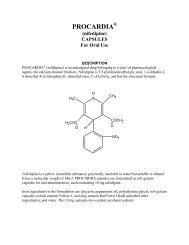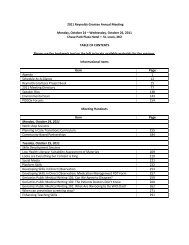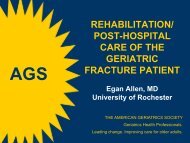Beers Criteria Public Translation - American Geriatrics Society
Beers Criteria Public Translation - American Geriatrics Society
Beers Criteria Public Translation - American Geriatrics Society
You also want an ePaper? Increase the reach of your titles
YUMPU automatically turns print PDFs into web optimized ePapers that Google loves.
prescribing for adults 65 or older. These medications pose a higher risk of side effects,<br />
may not work as well in an older person, and may be replaced with safer or more<br />
effective medications or non-drug remedies.<br />
• Medications used for 14 common health problems that are potentially inappropriate for<br />
older adults. Older adults often have other diseases or disorders in addition to these 14<br />
health problems that the medications may make worse.<br />
• 14 types of drugs that are potentially inappropriate and should be used only with<br />
caution in older adults. Drugs on this list may cause medication-related problems and<br />
may not be completely effective. However, they may be the best choice available for<br />
certain older patients. Healthcare providers need to carefully monitor how these drugs<br />
are working and keep an eye out for side effects. And older adults who take these<br />
medications, or their caregivers need to let their healthcare professionals know if these<br />
drugs don’t seem to be working, or appear to be causing side effects.<br />
How Health Professionals Are to Use this List<br />
Healthcare providers refer to the AGS <strong>Beers</strong> <strong>Criteria</strong> when deciding whether and what<br />
to prescribe for older adults, but should not make these decisions based only on the criteria.<br />
Among other reasons, they shouldn’t do this because the criteria don’t apply to all situations<br />
that older patients face. The criteria, for example, don’t take into account all of the unique<br />
circumstances of older people getting palliative or hospice care.<br />
Because the criteria shouldn’t dictate what healthcare providers prescribe, healthcare<br />
providers should not be penalized for prescribing a medication for an older person simply<br />
because it is on one of the criteria lists. Different older adults respond differently to the<br />
same medication, and, again, for some patients, drugs listed in the criteria will be the best<br />
choices.<br />
The criteria are also used in research, training, determining healthcare policy, developing<br />
insurance company policies regarding medication coverage, efforts to improve the quality of<br />
prescribing for older people, and the development of quality standards for drug therapy for<br />
older adults.<br />
What You Can Do<br />
To lower the chance of drug-related problems:<br />
• Keep a list of all of the medications you take—both non-prescription and prescription.<br />
This includes any supplements that you take, such as vitamins. You should also write<br />
down the doses, and bring it with you whenever you see a healthcare professional. This<br />
way, he or she will know what drugs and supplements you are taking and can check<br />
whether these might be causing side effects, or could cause side effects, if taken along<br />
with new medications.<br />
THE AGS FOUNDATION FOR HEALTH IN AGING<br />
Page 2<br />
WWW.HEALTHINAGING.ORG


